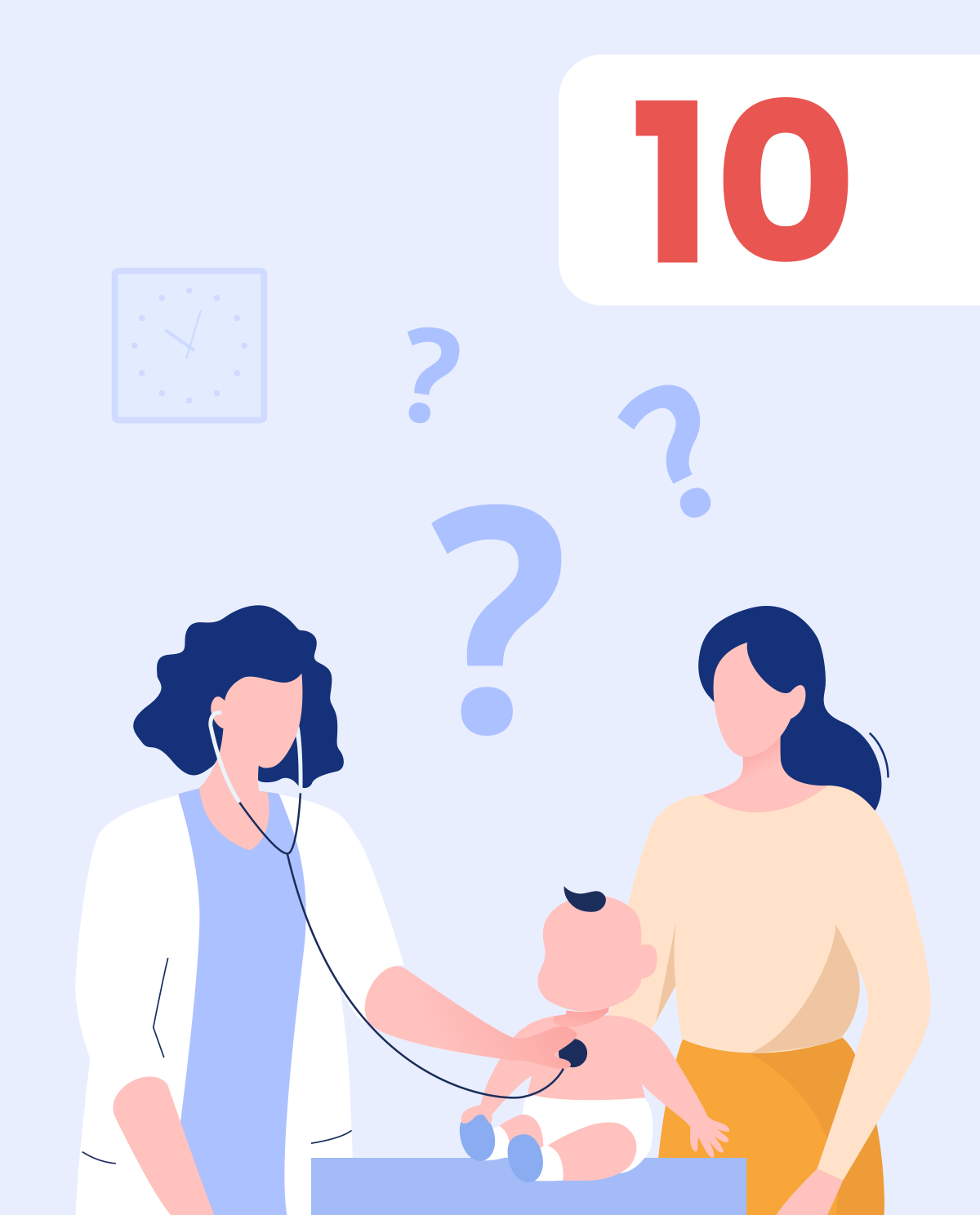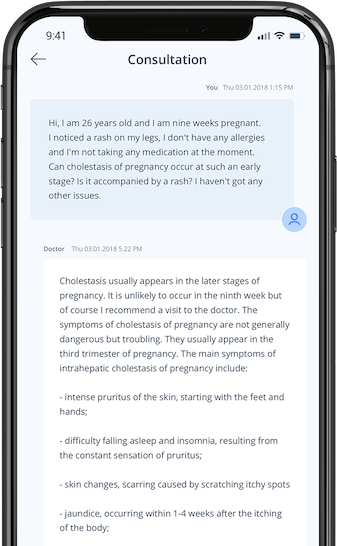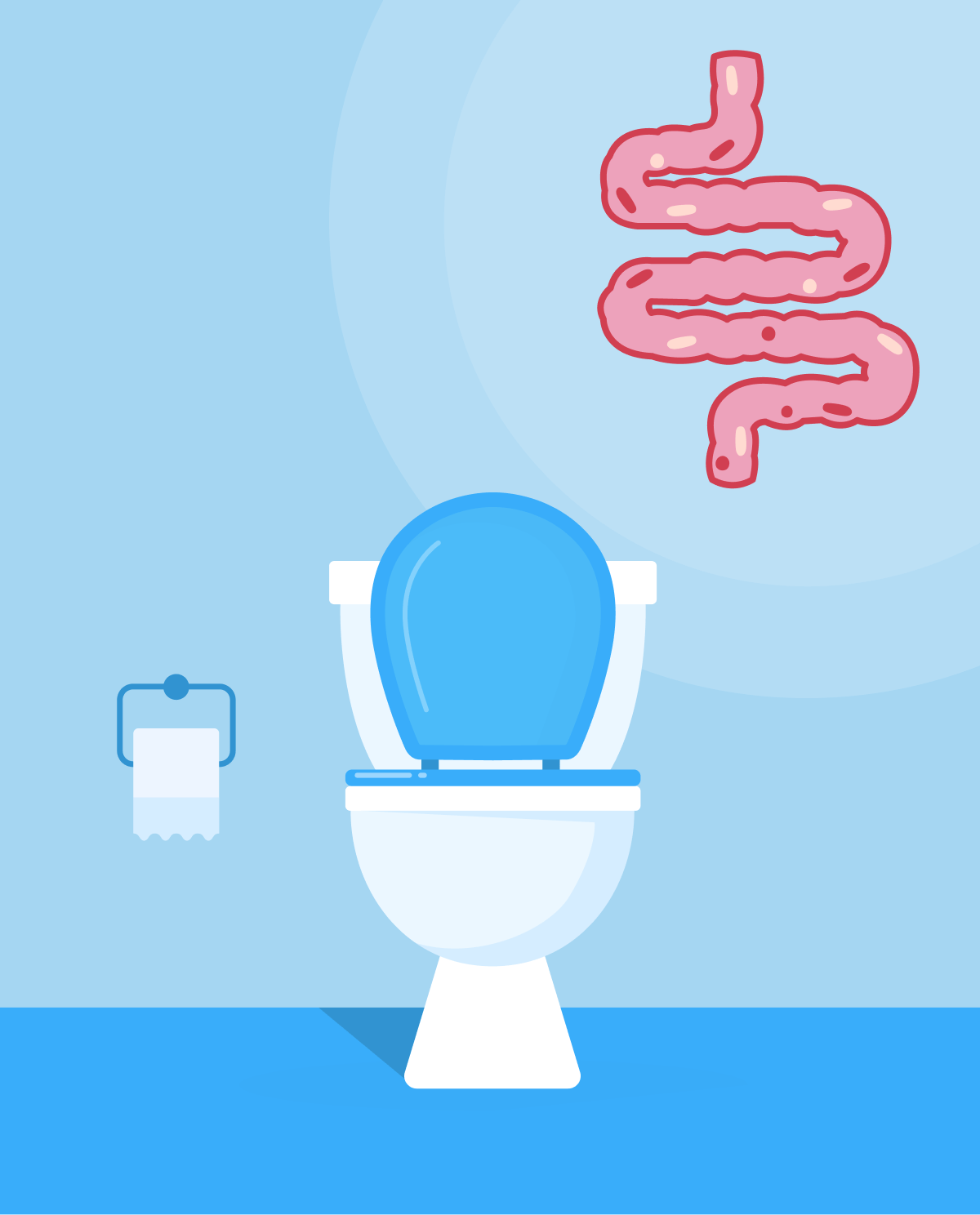- What to prepare for the first visit to a pediatrician?
- Diaper area skin care
- When to introduce foods other than milk?
- What supplements should be used in children?
- Should we go to the doctor with every child's infection?
- How to Prevent Infections?
- Is My Child Growing Properly?
- Should a Healthy Child Have a Complete Blood Count (CBC) Test?
- Why do children's legs hurt?
- How does COVID-19 affect children?
What to prepare for the first visit to a pediatrician?
The first postnatal check-up should take place in the 1-2 weeks of the child's life, the next meeting with a pediatrician should be scheduled around the 6th week. For the visit, it's worth taking with you:
- Child's health book
- Discharge note from the hospital
- Cotton diaper
- Blanket
- Diapers
- Spare clothing
- Wipes
- Bottle with milk (if the child is fed with formula or mixed-feeding)
- Pacifier
Diaper area skin care
The skin in the diaper area should be wiped with a cotton pad soaked in water or you can use wet wipes. Wipes vary in composition, some contain substances that can irritate the delicate skin of the child, it's worth looking for ones that are well tolerated by the infant. The direction of washing is very important: always from top to bottom. In addition, the skin should be protected with greasy preparations, such as ointments with allantoin, vaseline, D-panthenol. After applying the preparation, it is recommended to leave the baby without a diaper for a few minutes, so that the skin can dry and the ointment can absorb. Specialists do not recommend the use of zinc ointments, they can irritate the skin and promote inflammatory changes. It is also suggested to refrain from using dusting powders. Parents usually use them in excessive amounts, causing the product to clump, resulting in skin irritation.
When to introduce foods other than milk?
Introducing new foods results from the increasing demand for nutrients that milk alone can no longer satisfy. Complementary foods should be introduced no earlier than after the 17th week of the child's life and no later than the 26th week. At this age, most infants are able to start accepting solid products such as cooked vegetables or fruits, meat, eggs or cereals. Introducing other products:
- Cow's milk - should not be used as the main drink before the age of 12 months. Maximum consumption of 500ml per day.
- Honey - may contain spores of Clostridium botulinum causing infant botulism, should not be given to children before the age of 12 months.
- Gluten - can be introduced into the diet at any time after the 4th month of life.
What supplements should be used in children?
The use of dietary supplements in children should be limited and regularly controlled by a pediatrician. Excessive intake of these preparations can cause gastrointestinal discomfort, negatively affect the absorption of nutrients or interact with other drugs. Specialists recommend giving children only vitamin D in the dose:
| Age | Dose |
|---|---|
| Newborns and infants 0-6 months | 400 IU/day |
| Infants 6-12 months | 400-600 IU/day |
| Children and adolescents | 600-1000 IU/day |
Should we go to the doctor with every child's infection?
Most infections in children are caused by viruses and only require symptomatic treatment. Not every runny nose or sore throat needs to be immediately rushed to the office. If the child's condition is good and the intensity of the symptoms is minor or moderate, you can wait 2-3 days for the visit. In some cases, after a few days the child will not present any symptoms. In younger infants, every infection requires medical control, due to the structure of the respiratory tract, which favors the occurrence of respiratory disorders and obstruction. Symptoms that should prompt parents to visit a specialist include fever >38.5°C or fever not subsiding after antipyretics, refusal to eat, deterioration of the child's general condition, severe sore throat, pain during swallowing, acute or productive cough, cough lasting over 3 weeks, purulent runny nose.
How to Prevent Infections?
This is one of the most frequently asked questions to pediatricians, especially when the patient is a preschool-age child. Frequent infections associated with interactions with peers worry caregivers. Immune-boosting supplements are popular among parents, but their use is a matter of debate. So far, there is no credible scientific research confirming their effectiveness and safety of long-term use. The foundation of a child's well-being is a healthy lifestyle, i.e., a varied diet rich in all components necessary for proper development, physical activity, proper clothing adjusted to weather conditions. It's also important to take care of oral hygiene, as it can be a breeding ground for microorganisms.
Is My Child Growing Properly?
Parents are often concerned that their child is shorter or smaller than their peers. In most cases, this condition results from genetic predispositions and individual characteristics. The target height of the child can be estimated using the formula:
- For girls
(parent's combined height - 13) / 2 - For boys
(parent's combined height + 13) / 2
Whether a child's growth and weight are appropriate is determined by a doctor using special percentile charts appropriate for the child's age and gender.
Should a Healthy Child Have a Complete Blood Count (CBC) Test?
Accelerated development increases the need for oxygen and other components necessary for body functioning (e.g., iron). Increased demand and insufficient supply (e.g., due to a vegetarian diet) can lead to anemia. Specialists recommend that healthy, properly developing children have blood tests at 3 months, 6 months, and after completing 1 year of life. In the following years, it's advisable to monitor the CBC once a year, especially in girls during puberty.
Why do children's legs hurt?
A common cause of lower limb pain in children is growth pains. These occur between the ages of 4 and 12. They appear periodically, not daily, in the afternoon or evening, never in the morning. They symmetrically affect the thighs, the backs of the knees, and calves. Importantly, they are never localized in the joints! Physical performance is not limited and there are no abnormalities in the examinations. This condition does not require intervention. However, if we observe joint pain, warmth, redness, or swelling in the joint area, or a limitation of movement, we should take the child to a pediatrician or family doctor.
How does COVID-19 affect children?
Initial assumptions that the coronavirus epidemic spared children turned out to be unfounded. Studies show that children can not only carry the virus but also play a significant role in the development of the pandemic. Specialists claim that the respiratory tracts of infected children up to 5 years old contain 10 to 100 times more SARS-CoV-2 than adults. However, the course of the disease in children is significantly milder. Only 34% of the youngest experienced symptomatic disease, with 3.3% requiring intensive therapy. The most common symptoms in children are fever, cough, sore throat, fatigue, and muscle pain.
- "Pediatrics", Krystyna Kubicka, Wanda Kawalec (eds.), Medical Publishing House PZWL, Warsaw 2006, 3rd edition
- "Pediatrics for LEK and PES", Anna Dobrzańska, Jozef Ryżko, Elsevier Urban & Partner Publishing House, Warsaw 2014
- Kisiel K., Dzilińska K.: Skin care of newborns and small children. Med. Ped. Stand., 2014; 11: 659–668
- https://www.espghan.org/knowledge-center/education/COVID-19-Parental-Advice-Guide
- "Breastfeeding. Position of the Polish Society of Gastroenterology, Hepatology and Children's Nutrition" 2016.
- https://pulsmedycyny.pl/male-dzieci-moga-zakazac-koronawirusem-sars-cov-2-latwiej-niz-dorosli-badanie-998405
- Ludvigsson JF. Systematic review of COVID-19 in children shows milder cases and a better prognosis than adults. Acta Paediatr. 2020;109:1088-1095.








